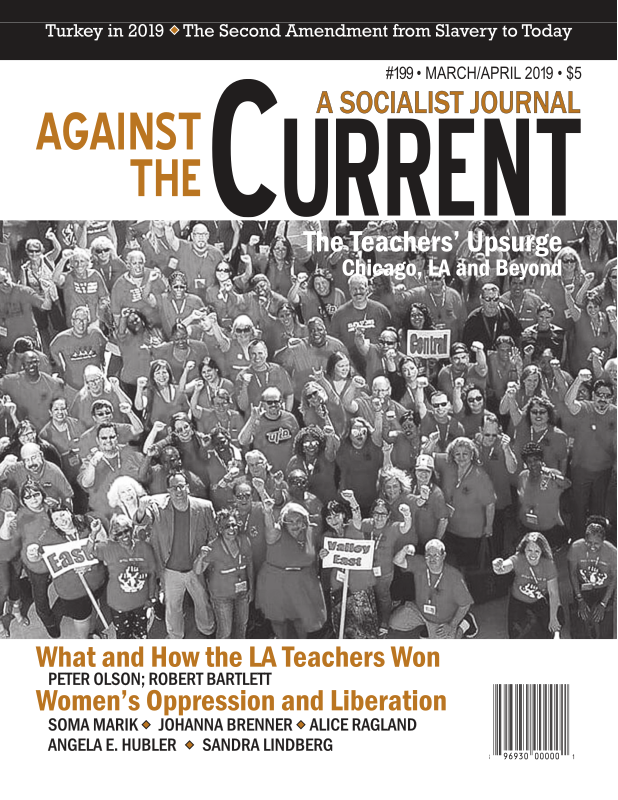Against the Current, No. 199, March/April 2019
-
Whose "Security" -- and for What?
— The Editors -
MLK in Memphis, 1968
— Malik Miah -
California Burning, PG&E Bankrupt
— Barri Boone -
PG&E Bankruptcy
— Barri Boone -
What Los Angeles Teachers Won
— Peter Olson -
The UTLA Victory in Context
— Robert Bartlett -
Chicago Charter Teachers Strike, Win
— Robert Bartlett -
Turkey in 2019: An Assessment
— Yaşar Boran -
Betraying the Kurds
— David Finkel -
The Strange Career of the Second Amendment, Part II
— Jennifer Jopp -
Who Is Responsible?
— David Finkel -
A Note of Thanks
— The Editors - Socialist Feminism Today
-
Women's Oppression and Liberation
— Soma Marik -
Marx for Today: A Socialist-Feminist Reading
— Johanna Brenner -
Angela Davis: Relevant as Ever After Thirty Years
— Alice Ragland -
The Activism of Angela Davis
— David Finkel -
White Women and White Power
— Angela E. Hubler -
Lots of Scurrying But No Revolution in Sight
— Sandra Lindberg - Reviews
-
A Call to Action
— Patrick M. Quinn -
Orbán: Strong Man, Authoritarian Ideology
— Victor Nehéz -
A Sympathetic Critical Study
— Peter Solenberger -
Further Reading on the Russian Revolution
— Peter Solenberger
David Finkel
MILITARIST HAWKS AND liberal pundits alike are up in arms (figuratively, of course) over Donald Trump’s “victory” proclamation and announcement of U.S. troops’ withdrawal from Syria. What does it actually mean for the cascading disasters in the Middle East?
It’s certainly true that a couple thousand U.S. troops can’t resolve the Syrian civil war and destruction of that country, and that U.S imperialism has no legitimate business intervening there or anywhere else.
This doesn’t mean that Trump’s plan to withdraw this force has any progressive significance, or anything to do with peace. It’s a move on a regional chess board — and for imperialism, allies are pawns.
Syrian Kurdish forces have been the most effective fighters against the brutal “Islamic State.” They saved the Yazidi population from ISIS genocide on Sinjar mountain, liberated hundreds of Yazidi women from sexual enslavement, and defended the town of Kobane against the ISIS siege. Trump’s announcement might be a gesture to Turkey’s presidentialist-dictator Recep Tayyip Erdogan, and it’s a cynical betrayal of the Kurdish fighters.
Erdogan’s number one priority is crushing Kurdish national aspirations, along with all democratic opposition to his rule. The presence of U.S. troops in northeastern Syria restrains Turkey from launching a murderous assault on the Kurds there.
The imperial knife in the back of the Kurds and their desire for autonomy or independence is a recurring story. At the same time, Saudi Arabia’s murderous U.S.-coddled royal house is driving Yemen to genocidal famine. Israeli and U.S. threats against Iran are provoking Tehran’s buildup of its own asymmetric deterrent — the supply of sophisticated guidance missiles to Hezbollah near the Lebanon-Israel border.
The main point to understand is that imperialism creates problems that it cannot solve. That’s been disastrously evident ever since the U.S. invasion of Iraq in 2003.
It’s criminal that Democratic politicians, including some supposed liberals, are trying to outflank Donald Trump by striking a more militaristic posture. But it’s a big mistake for well-intentioned folks in the peace movement to say they support or even applaud Trump’s withdrawal announcement. The question isn’t whether this or that tactical move — or verbal posture — by this imperialist administration is a good or bad thing, in isolation from its overall military-political interventionist project.
Trump now says he wants to move the U.S. troops from Syria into Iraq, in order to “keep an eye on Iran.” It’s not clear exactly what that even means, but it’s undoubtedly part of the ominous and growing U.S. threats against Iran, which can only make matters worse. And Iraq’s political leadership has responded angrily against being drawn into Washington’s anti-Iran crusade, to say nothing of being treated like Donald Trump’s bathmat.
In the region’s horrifying descent into sectarianism, civil war and mass destruction, the Kurdish freedom movement, especially in Syria, is the only remaining force that both represents democratic aspirations and has some military capacity. Despite its limits and contradictions, this is the movement that should command the solidarity of international left and antiwar forces.
The United States has had a great deal to do with creating the disasters afflicting people from Afghanistan to Palestine. The political uproar over whether a suddenly announced troop withdrawal from a corner of Syria is or is not “in our fundamental strategic interests” doesn’t even touch the reality that it’s precisely those “interests” that are the problem.
March-April 2019, ATC 199

